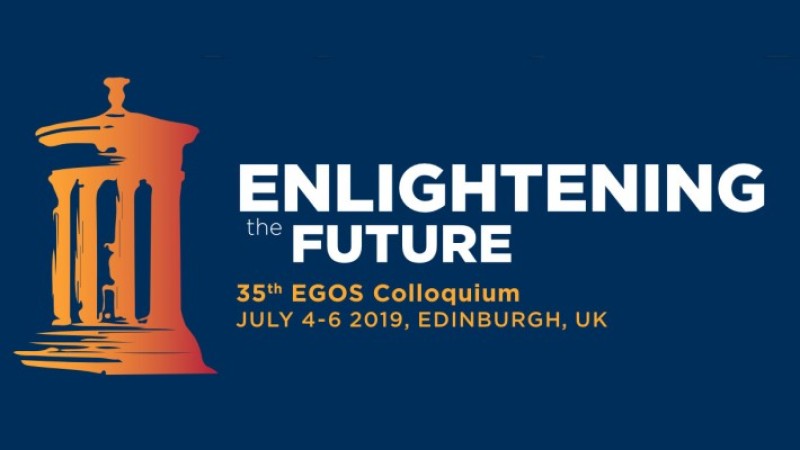Sub-theme 61: Advancing Enlightenment: Philosophical Ideas and Methods for Organizational Research
Call for Papers
The purpose of this sub-theme is to explore the potential of philosophical ideas and methods to advance organizational
research for the benefit of society and humanity and to address grand challenges humankind is facing. This aim aligns the
central Enlightenment principles of engaging humanist values, reflection, and reasoning as foundations of meaning, knowledge,
and informed action. In the past two hundred years the Enlightenment principles have been the basis of the development of
the sciences and of political, economic, and societal institutions, with all its positive achievements, but also negative
effects for people and planet.
We recall that Adam Smith studied moral philosophy at the University of Glasgow,
lectured at the University of Edinburgh, became the head of Moral Philosophy at Glasgow, and collaborated with the Scottish
philosopher, David Hume. Further, inspired by Immanuel Kant (1784), we define enlightenment as “the human being’s emergence
from his or her self-inflicted immaturity”. Kant elaborated that immaturity is self-inflicted not simply “from a lack of understanding,
but from the lack of resolve and courage to use one's reason without the guidance of another” (Kant, 1784, p. 481, translated
by A.G. Scherer).
To date, the use of one’s reason is discouraged by developments on at least four political,
social, and technological fronts: first, by the growing societal influence of ideologies such as fundamentalism, populism,
and anti-environmentalism; second, by the dominance of political institutions, leaders, or elites with an anti-enlightenment
agenda; third, by skepticism against the sciences, technologies, and innovations and the emergence of anti-scientific world-views;
and forth, by the growing impact of technologies and artificial intelligence on individual and collective decisions. These
developments sustain old or create new forms of immaturity. As a result, the principles of the enlightenment are in peril,
and reason as a basis of informed individual and collective action is increasingly replaced by anti-rational ideologies, autocratic
leaders, technocratic elites, and intelligent machines and algorithms taking control of one’s life.
We invite
EGOS scholars to address these challenges and to join us in illustrating and debating how one can use philosophical ideas
and methods to rejuvenate, uphold, and advance the principles of the enlightenment to make human values, reflection and reasoning
the basis for organizational practice for the benefit of humanity and the protection of the planet.
While
management and organization has been informed by many philosophical ideas – from Aristotle to Kant, from Confucius to Smith,
from Hume to Dewey, from Marx to Castoriadis, from Habermas to Derrida – the distance from principled adoption to engaged
application in research and practice has been less travelled. Our sub-theme is open to a variety of such applications – for
example, analytical or modal logic, dialectics, phenomenology, hermeneutics, deconstruction, speculative synopsis and synthesis,
and thought experiments. We therefore respond to widespread agreement among organization scholars that the complex, systemic
problems facing our discipline and practice today are in need of new responses from organizational scholarship and practice,
based on fundamentally reconsidered ways of thinking.
We invite submissions that break new ground in addressing
questions such as:
- What are the challenges for the Enlightenment today? What old forms of immaturity prevail and what new forms of immaturity emerge in today’s societies?
- How can philosophical ideas and methods enlighten or redirect organizational research?
- What are the ontological, epistemological, methodological, and ethical limitations of received organizational research, and where can philosophy help pushing boundaries?
- What would be some of the more productive modalities of transitioning from observation and practice to philosophical reflection, and back?
- How can organizations leverage these transitions, for a better understanding of the complex phenomena unfolding in their midst?
- How does philosophy help organizational scholars better understand and address societal and ecological challenges?
- How can we address social issues such as inequality, discrimination, nationalism, populism, religious fundamentalism, intercultural conflicts, modern slavery – through philosophical ideas and methods?
- What can philosophical approaches tell us about exploring technical advancements such digitalization, social media, sharing economy, robotics, brain or neuro-research, etc.?
- What are the principal contributions and limitations of philosophical reflection?
References
- Cappelen, H., Gendler, T.S., & Hawthorne, J. (eds.) (2016): The Oxford Handbook of Philosophical Methodology. Oxford: Oxford University Press.
- Donaldson, T., & Dunfee, T.W. (1994): “Toward a unified conception of business ethics: Integrative social contracts theory.” Academy of Management Review, 19 (2), 252–284.
- Ferraro, F., Etzion, D., & Gehman, J. (2015): “Tackling grand challenges pragmatically: Robust action revisited.” Organization Studies, 36, 363–390.
- Habermas, J. (1971): Knowledge and Human Interests. Boston: Beacon.
- Kant, I. (1784): „Beantwortung der Frage: Was ist Aufklärung?“ Berlinische Monatsschrift, 4, 481–494.
- Scherer, A G., & Palazzo, G. (2007): “Toward a political conception of corporate responsibility: Business and society seen from a Habermasian perspective.” Academy of Management Review, 32 (4), 1096–1120.
- Werhane, P. (1991): Adam Smith and his Legacy for Modern Capitalism. New York: Oxford University Press.
- Zuboff, S. (2015): “Big other: surveillance capitalism and the prospects of an information civilization.” Journal of Information Technology, 30, 75–89.


